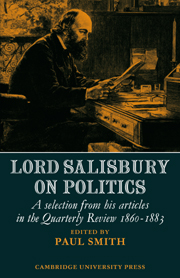Book contents
- Frontmatter
- Contents
- Preface
- List of abbreviations
- Editor's introduction
- Bibliographical note
- ‘The Budget and the Reform Bill’ (April 1860)
- ‘The House of Commons’ (July 1864)
- ‘The Reform Bill’ (April 1866)
- ‘The Change of Ministry’ (July 1866)
- ‘The Conservative Surrender’ (October 1867)
- ‘The Programme of the Radicals’ (October 1873)
- ‘Disintegration’ (October 1883)
- Index
- Cambridge Studies in the History and Theory of Politics
‘The Conservative Surrender’ (October 1867)
Published online by Cambridge University Press: 06 July 2010
- Frontmatter
- Contents
- Preface
- List of abbreviations
- Editor's introduction
- Bibliographical note
- ‘The Budget and the Reform Bill’ (April 1860)
- ‘The House of Commons’ (July 1864)
- ‘The Reform Bill’ (April 1866)
- ‘The Change of Ministry’ (July 1866)
- ‘The Conservative Surrender’ (October 1867)
- ‘The Programme of the Radicals’ (October 1873)
- ‘Disintegration’ (October 1883)
- Index
- Cambridge Studies in the History and Theory of Politics
Summary
INTRODUCTORY NOTE
Cranborne could hardly have foreseen in July 1866 the extraordinary course of events which he was to review when he next wrote for the Quarterly in the autumn of 1867. Having come into office by resisting Gladstone's moderate Reform Bill, Derby and Disraeli, in the space of a year, led the House of Commons step by step into a measure of more than twice the size, which, by establishing household suffrage in the boroughs, seemed drastically to alter the balance of electoral power in favour of the urban working man. As a feat of dexterity and impudence, their successful conduct of the Reform Bill of 1867 was a triumph; as an act of moral tergiversation, it seemed to Cranborne to mark a new nadir in their leadership of the Conservative party.
The volte-face of 1866–7 was the product of political expediency. Neither Derby nor Disraeli wanted Reform as such: they were driven to accept it by the dictates of party and personal advantage. Their overriding concern was to make their ministry something more than a mere interlude between the last Liberal administration and the next; to show that the Conservative party, almost permanently out of office for twenty years, was capable of giving the country sound government, and, far from being reactionary and obscurantist, was sufficiently flexible in outlook to provide such instalments of moderate, constitutional progress as the nation might require – including, if necessary, parliamentary reform.
- Type
- Chapter
- Information
- Lord Salisbury on PoliticsA selection from his articles in the Quarterly Review, 1860-1883, pp. 253 - 291Publisher: Cambridge University PressPrint publication year: 1972



